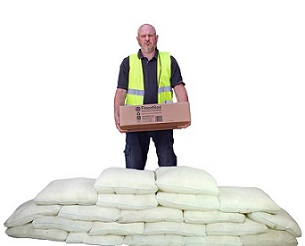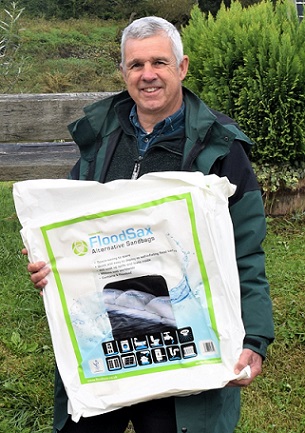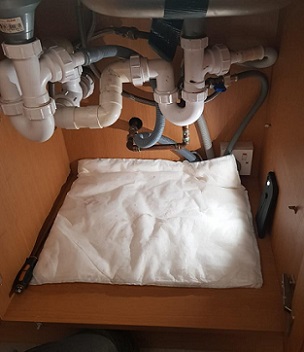 All these 20 FloodSax alternative sandbags came from this one easy-to-carry box
All these 20 FloodSax alternative sandbags came from this one easy-to-carry box
 Many local councils now use FloodSax as they are so easy to store
Many local councils now use FloodSax as they are so easy to store
 Unlike sandbags, FloodSax are multi-use and can also soak up leaks and spills inside
Unlike sandbags, FloodSax are multi-use and can also soak up leaks and spills inside
Why FloodSax alternative sandbags are so much more environmentally friendly than traditional sandbags
Protecting the environment is high on everyone’s agenda these days and here’s why FloodSax alternative sandbags are way more environmentally-friendly than traditional sandbags and have such good green credentials.
FloodSax, which are 96% biodegradable by weight, are vacuum-packed for neat, easy storage with one box of 20 equal to 20 sandbags on a pallet.
Unlike sandbags, FloodSax are flexible and multi-functional so in their dry state can be deployed inside to soak up drips, leaks, spills and floods to prevent expensive-to-repair damage.
Hundreds can be taken to the scene by one person in a car and thousands transported in a van. This vastly reduces the carbon footprint of transporting the FloodSax.
Ordinary sandbags are heavy and take up vast amounts of storage space in large warehouses, using up land and construction materials to build along with expensive energy to light and heat.
When deployed, ordinary sandbags need large vehicles such as lorries to take them anywhere at another cost to the environment, from the vehicle’s engines churning out carbon monoxide which is toxic to humans and carbon dioxide, a greenhouse gas which is thought to be a major contributory factor to climate change.
Delivering FloodSax is two-thirds cleaner to the environment than delivering sandbags.
One pallet will contain 480 FloodSax and the cost to the environment is 59g of CO2 per km while one pallet of sandbags is just 50 bags and the cost to the environment is 184g per km.
A full lorry load of FloodSax weighs 5,760kg with a cost to the environment of 481g per km.
A full lorry load of sandbags weighs 18,000kg and the cost to the environment is 1,504g per km.
FloodSax manufacturer Environmental Defence Systems Ltd commissioned an independent report which concluded that it is tCO2 per km is 0.0002 to deliver 600 FloodSax and 0.0163 to deliver 600 sandbags. Based on the Carbon Reduction Commitment carbon levy of £12 per tonne of carbon (this is where companies over a certain size, including local authorities, have to pay a tax per tonne of carbon emitted) the cost per km is £0.000017 for 600 FloodSax compared to £0.0014 per km for 600 sandbags.
Sandbags use one of the earth’s natural resources – sand - but can also rapidly deteriorate and the spilled sand is then notoriously hard to clean up, causing more environmental damage.
The damage caused by any kind of flood can be astronomical with insurance claims from floods typically 37 times greater than from burglaries. The typical average claim in the UK after a flood is £31,000 for homes and £70,000 for businesses.
By stopping a flood using FloodSax it would save all the cost of repairs and the vast amount of raw materials needed to do the full renovation.
FloodSax have been designed to be largely biodegradable and can go into landfill.
They should be disposed of once they have been used to stop flooding … and the same goes for traditional sandbags.
This is because floodwater is always contaminated and this could range from sewage and chemicals to fuel and oil.
Most of the inner material within a FloodSax - the gelling polymer and wood pulp - is biodegradable so if you want to shrink the FloodSax after use cut across it diagonally from corner to corner with a knife and then pour table salt on the white inners which will break down the polymer.
This reduces the size of the FloodSax which can then be thrown into the general waste to go to landfill where most of it will biodegrade over time.
The most environmentally-friendly way to deal with the FloodSax is to slice it open, drop the gelling polymer inners into your household rubbish bin and then incinerate the outer cover which has nylon stitching and is made from a nylon polymer material.
Once buried 6ft or more the gelling polymer inside the FloodSax should break down within 3 months.
If short of time, the FloodSax can be thrown away without cutting it across and adding the salt.
If FloodSax are used on an industrial scale they could be taken to a specialist disposal company which would use powerful equipment to squeeze the water out of the FloodSax. A company in the UK does this and then bales all the outer covers before incinerating them.